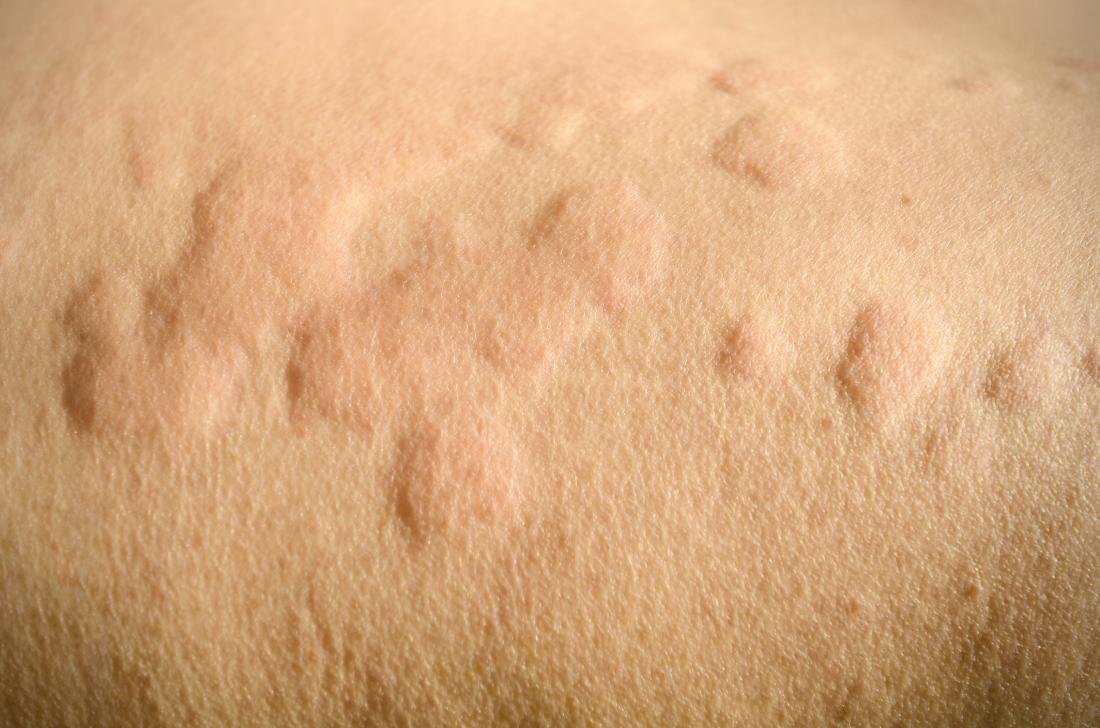There are a few different food allergies that can cause itchy skin. The most common is an allergy to peanuts, which can cause severe itching and even hives. Other common food allergies include fish, shellfish, eggs, and milk.
If you have an allergy to any of these foods, you may experience itchy skin after eating them.
Do you have itchy skin? Do you sometimes feel like you can’t scratch enough? If so, you may be suffering from a food allergy.
While there are many different causes of itchy skin, if you find that your symptoms seem to be linked to certain foods, it’s worth investigating whether or not you have a food allergy.
There are a few different types of food allergies that can cause itchy skin. One is an allergic reaction to the proteins in certain foods.
This type of reaction is often seen in people who are allergic to eggs, milk, or peanuts. When these proteins come into contact with the skin, they can cause an inflammatory response that leads to itching and redness.
Another type of food allergy that can cause itchy skin is an intolerance to certain carbohydrates.
This type of intolerance is often seen in people who are sensitive to gluten, which is found in wheat, barley, and rye. When gluten comes into contact with the skin, it can cause a rash called dermatitis herpetiformis. This rash is extremely itchy and can be very painful as well.
Dry, Itchy Skin Could Be Due to Food Allergies
Body Itching After Eating
Body itching after eating can be a sign of an allergic reaction. If you have body itching after eating, it is important to see your doctor to find out the cause. Body itching after eating may be caused by a food allergy, or it may be caused by an intolerance to a food.
Food allergies can cause severe reactions, so it is important to get medical help right away if you think you may have one.
Food Not to Eat for Itchy Skin
There are a few foods that can cause itchy skin, and you may not even know it! If you have chronic itchiness, or if your skin starts to feel itchy after eating certain foods, pay attention to see if there’s a correlation. Here are some of the most common culprits:
1. Dairy products – Milk, cheese, and other dairy products contain a protein called casein that can be very irritating to the skin. If you have eczema or other sensitive skin conditions, avoid dairy altogether.
2. Nightshades – Potatoes, tomatoes, peppers, and eggplant belong to the nightshade family of plants.
These fruits and vegetables can contain an alkaloid called solanine that can trigger inflammation in the body…and consequently, itchiness on the skin.
3. Citrus fruits – The acidity in citrus fruits like lemons, oranges, and grapefruits can irritate sensitive skin. If you find that your skin feels itchy after eating these fruits (or drinking their juices), cut them out of your diet for a while to see if there’s any improvement.
Foods That Cause Itching at Night
There are many different types of food that can cause itching at night. Some of the most common include dairy products, eggs, nuts, and shellfish. However, there are also a number of other potential culprits.
Here is a closer look at some of the most likely offenders:
Dairy Products: Dairy products are a common source of histamine, which is known to cause itching. If you eat dairy products before bed, you may be more likely to experience itchiness at night.
Eggs: Like dairy products, eggs contain histamine. In addition, they also contain albumin, which can further irritate the skin. Nuts: Nuts are another common source of histamine.
They can also contain oils that can aggravate the skin. Shellfish: Shellfish is a common allergen that can cause severe itching in some people. Other Potential Culprits: There are a number of other potential causes of nighttime itching, including stress, certain medications, and underlying medical conditions.
If you experience frequent or severe itchiness at night, it’s important to see your doctor to rule out any serious underlying causes.
Itching After Eating Sweet Things
If you’re experiencing itching after eating sweet things, it’s possible you have a sugar allergy. Sugar allergies are rare, but they can cause a range of symptoms including itching, hives, and swelling. If you think you might have a sugar allergy, it’s important to see a doctor to get properly diagnosed.
Food Allergy Itchy Skin No Rash
If you have itchy skin, but no rash, it could be caused by a food allergy. When your body reacts to a food allergen, it can cause histamine to be released into your bloodstream. This can lead to itching and swelling, even if there’s no visible rash.
If you suspect that you have a food allergy, it’s important to see an allergist for testing. They can help you determine which foods are causing your symptoms and develop a plan to avoid them in the future.
Home Remedies for Food Allergy Itching
If you suffer from food allergies, you know that the itchiness can be unbearable. You may have tried over-the-counter medications, but they don’t always work. Luckily, there are some home remedies that can help relieve the itchiness and allow you to get on with your life.
One of the best home remedies for food allergy itching is to take a baking soda bath. Simply add 1-2 cups of baking soda to a warm bath and soak for 15-20 minutes. The baking soda will help to soothe your skin and reduce the inflammation.
If you don’t have time for a bath, you can also make a paste out of baking soda and water and apply it directly to the affected areas. Leave it on for 10-15 minutes before rinsing off with cool water.
Another great home remedy is to use oatmeal.
Oatmeal has anti-inflammatory properties that can help to reduce the swelling and itching associated with food allergies. You can either make an oatmeal paste or add some oatmeal to your bathwater and soak for 20 minutes.
Finally, one of the simplest home remedies is to apply a cold compress to the affected area.
Food Allergy Rash Pictures
If you are one of the millions of Americans who suffer from food allergies, you know that even a small amount of the wrong food can cause a big problem. Allergic reactions to food can range from a mild rash to a life-threatening condition called anaphylaxis.
Most people with food allergies have skin reactions, such as hives, itching, or swelling.
But some people also have more serious reactions that affect their breathing or their heart rate. These types of reactions are called anaphylactic reactions, and they can be life-threatening. If you have a severe reaction to a food, you will need to carry an EpiPen with you at all times in case you accidentally eat something that contains the allergen.
If you think you might have a food allergy, it’s important to see an allergist for testing. Once your allergens have been identified, you can work with your doctor to create a plan to avoid them. You should also make sure that your family and friends know about your allergies in case they need to help you during a reaction.
Itchy Skin After Eating Carbohydrates
There are a few different reasons why someone may experience itchy skin after eating carbohydrates. One reason is histamine intolerance. Histamine is a compound that’s released when the body comes into contact with an allergen.
When someone has histamine intolerance, they’re unable to break down histamine properly, which can lead to symptoms like itchiness, hives, and swelling.
Another reason for itchy skin after eating carbs could be due to the fact that many processed foods contain additives and preservatives that can irritate the skin. Many of these chemicals are known as “excitotoxins” because they excite nerve cells to the point of damage or death.
Excitotoxins have been linked to a number of neurological disorders, and they can also cause inflammation and irritation in the skin.
Finally, some people may simply be sensitive to certain types of carbohydrates. For example, those who are sensitive to gluten may experience itchiness after eating wheat-based products.
It’s also possible to be allergic to specific types of carbohydrates, such as those found in corn or rice.

Credit: www.medicalnewstoday.com
Can Food Allergies Cause Body Itching?
There are a variety of different allergies that people can have. Some people are allergic to pollen, dust, dander, and even certain foods. A food allergy occurs when the body’s immune system has an adverse reaction to a particular food protein.
The body views the protein as a foreign invader and works to destroy it. This process can cause a number of symptoms, including itchiness.
Itchy skin is a common symptom of many allergies, but it can also be caused by other conditions such as eczema or psoriasis.
If you have an itchy rash or hives after eating certain foods, you may be experiencing an allergic reaction. Other symptoms of a food allergy include difficulty breathing, swelling in the throat or mouth, and vomiting. If you experience any of these symptoms after eating, it’s important to see your doctor for proper diagnosis and treatment.
What Foods Cause Body Itching?
When it comes to food and itchiness, there are a few things that can cause this uncomfortable sensation. One of the most common culprits is histamine intolerance. Foods high in histamine can trigger itchiness, as well as other symptoms like hives, swelling, and difficulty breathing.
Other foods that have been known to cause itching include those that contain quercetin ( found in onions and tomatoes) and sulfites ( found in dried fruits, wine, and some processed foods). If you suspect that your itchiness is being caused by one of these foods, it’s best to avoid them or eat them in moderation. You may also want to talk to your doctor about getting tested for allergies.
What Kind of Allergy Causes Itchy Skin?
If you have itchy skin, there are several possible causes. An allergy is one possibility. Many different things can cause allergies, including certain foods, medications, environmental factors, and even insects.
If you have an allergy, your body reacts to a substance that doesn’t bother most people. This reaction can cause symptoms like itching, swelling, and trouble breathing.
There are many other possible causes of itchy skin as well.
Dry skin is a common culprit. When your skin is dry, it doesn’t have enough moisture to protect itself from irritants like soap or clothing. This can lead to itchiness.
Other conditions that can cause itchy skin include eczema, psoriasis, and shingles. If you’re not sure what’s causing your itchy skin, see your doctor for an evaluation.
What are 7 Signs of a Food Allergy?
There are 7 signs of a food allergy:
1. itching or swelling in the mouth
2. hives, eczema, redness or swelling of the skin
3. wheezing, difficulty breathing or shortness of breath
4. nausea, vomiting or diarrhea
5. abdominal pain
6. lightheadedness or dizziness
Conclusion
Most people are familiar with the more common food allergies that cause itchy skin, such as peanuts or shellfish. But there are many other foods that can cause this reaction as well. Some of the less common allergens include eggs, milk, soy, wheat, and certain fruits and vegetables.
For some people, even touching these foods can cause an itchy skin reaction. In severe cases, ingesting even a small amount of the allergen can trigger a life-threatening reaction called anaphylaxis.
If you have any suspicion that you may be allergic to a particular food, it’s important to see an allergist for testing.
Once diagnosed, you’ll need to avoid the allergen entirely and be sure to carry emergency medication with you at all times in case of accidental exposure.

